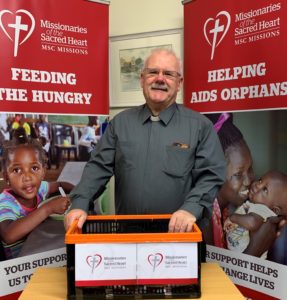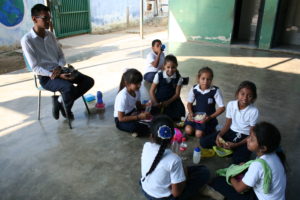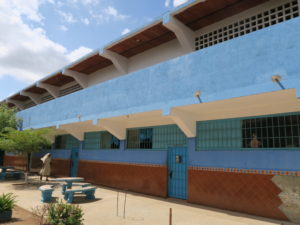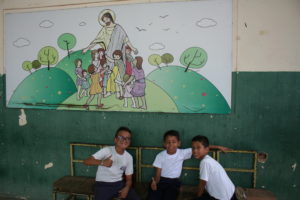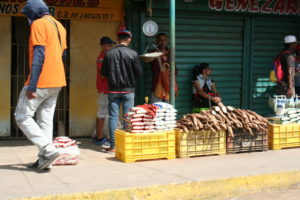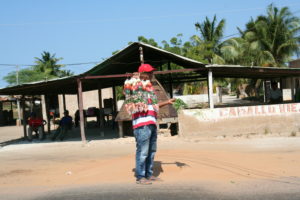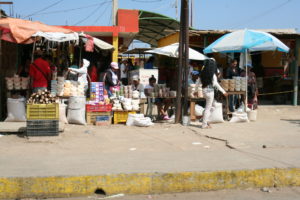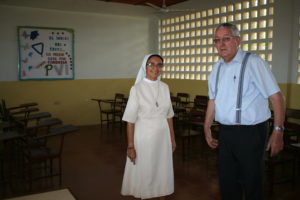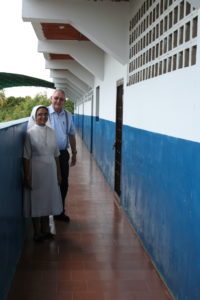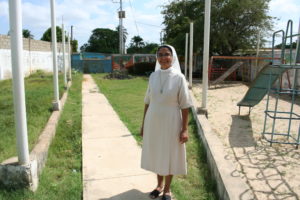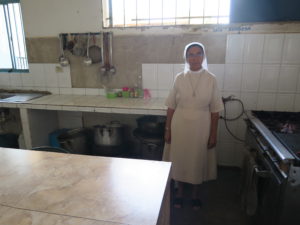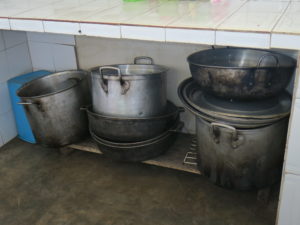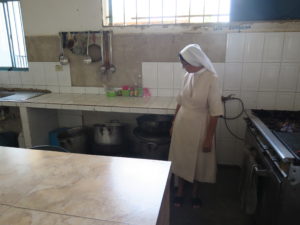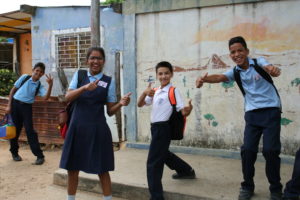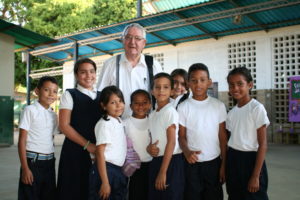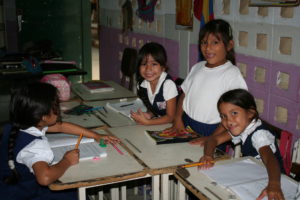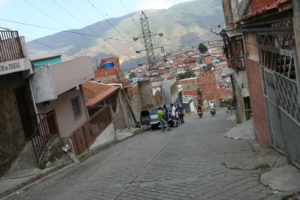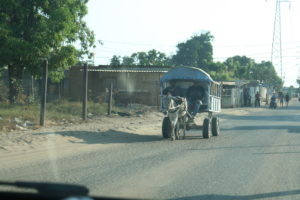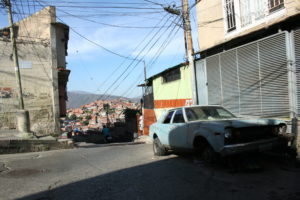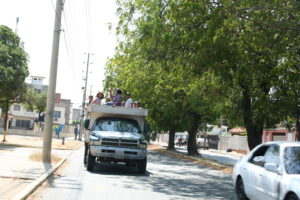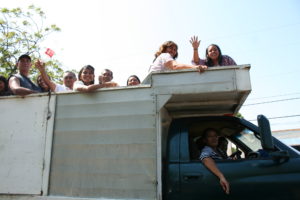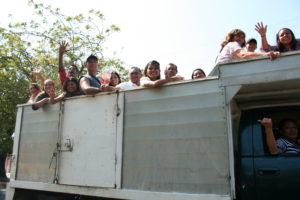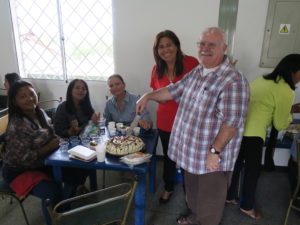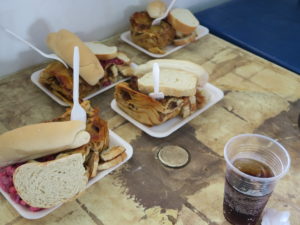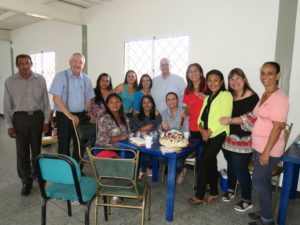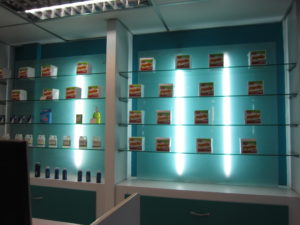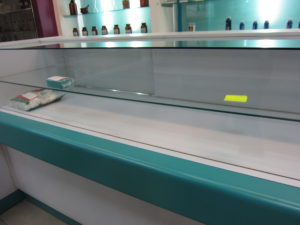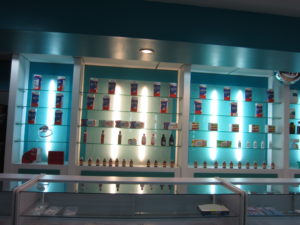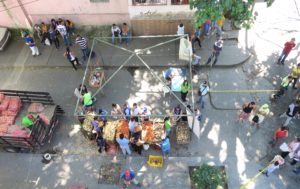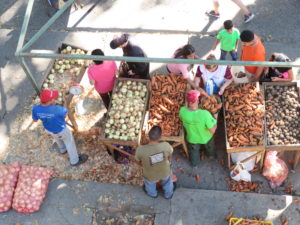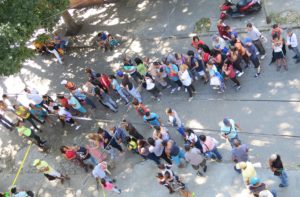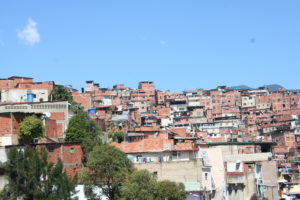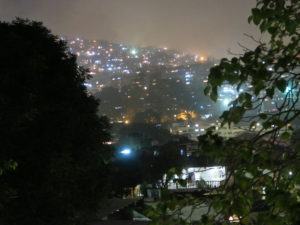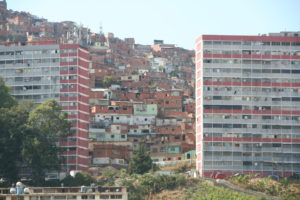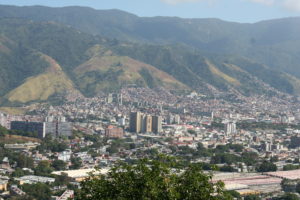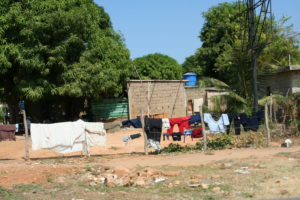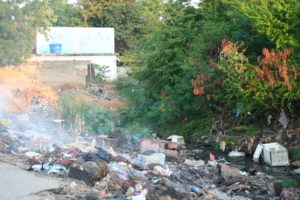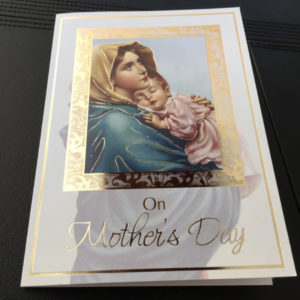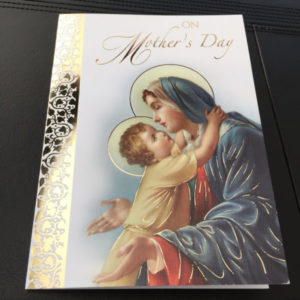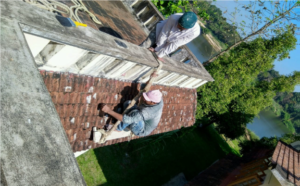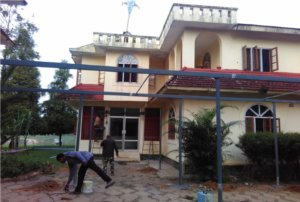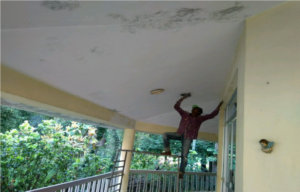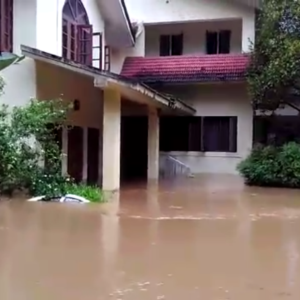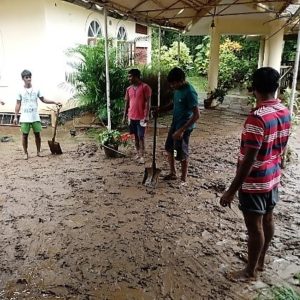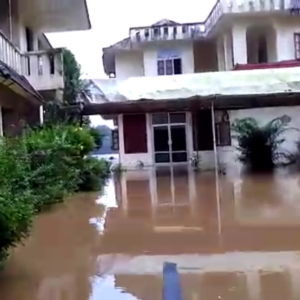MSC Easter Draw 2019: Winners
MSC Easter Draw 2019
Congratulations to the winners of this year’s MSC Easter Draw!
Prize Winners:
1st Prize: €2,000 Cruise Travel Voucher
A. Jelliffe
Schull, Co. Cork
2nd Prize: €1,500 Sun Holiday Voucher
T. Kelly
Fenit, Co. Kerry
3rd Prize: €1,000 City Break Voucher
N. Greene
Ennis, Co. Clare
4th Prize: €1,000 TV/Audio Voucher
A. Grennan
Loughrea, Co. Galway
5th Prize: €1,000 TV/Audio Voucher
M. Conway
Cobh, Co. Cork
6th Prize: €1,000 Home Furniture Voucher
G. Drummond
Sneem, Co. Kerry
7th Prize: €1,000 Home Furniture Voucher
I. Finlay
Greystones, Co. Wicklow
8th Prize: €500 Weekend Break Voucher
C. Norris
Tullow Road, Co. Carlow
9th Prize: €500 Weekend Break Voucher
M. Flynn
Dublin Rd., Galway
10th Prize: €500 Computer/Tablet Voucher
J. Mannion
Ballinasloe, Co. Galway
11th Prize: €500 Computer/Tablet Voucher
M. Cunniffe
Strokestown, Co. Roscommon
12th Prize: €500 Home Decor Voucher
K. Carroll
Arklow, Co. Wicklow
13th Prize: €500 Home Decor Voucher
D. McConnell (Jnr.)
Ardrahan, Co. Galway
14th Prize: €500 Garden / Outdoor Voucher
J. Lennon
Kilnamanagh, Dublin 24
15th Prize: €500 Garden / Outdoor Voucher
M. Foster
Dundalk, Co. Louth
16th Prize: €500 Home Appliances Voucher
J. O’Leary
Ennis, Co. Clare
17th Prize: €500 Home Appliances Voucher
C. A. O’Neill
Omagh, Co. Tyrone
18th Prize: €500 Hot Air Balloon Voucher
K. Hubbard
Kilkee, Co. Clare
19th Prize: €500 Driving Lessons Voucher
S. Gillespie
Boyle, Co. Roscommon
20th Prize: €500 Cookery Class Voucher
M. Cashman
Rocklands, Co. Wexford
10 X €200 Shopping Voucher – Click to view winners
30 X €100 Shopping Voucher – Click to view winners
All winners will be notified individually.
We would like to extend our sincere thanks to everyone who took part in this year’s draw.
This year’s MSC Easter Draw took place on Wednesday, April 17th 2019.
Fr Michael visits Venezuela: In the classroom
In January 2019, MSC Missions Office Director Fr Michael O’Connell spent three weeks in Venezuela, visiting MSC parishes in the cities of Maracaibo and Caracas. Here, he shares his experiences and his thoughts on a country in crisis.
“The Our Lady of the Sacred Heart School in Maracaibo currently has approximately 850 to 900 students, from infants right up to teenagers. Of these students, only 300 are registered on the government official registration site at the moment, as the government only opens up registration every so often. Therefore, it’s a slow process, but the school are very confident that it will be done.
The government has introduced a day for teachers, but this year, they didn’t have a big celebration; in the current climate of hunger and poverty, there isn’t much to share. The municipality has asked every school to name a Teacher of the Year and to give them a present. The teachers here asked Fr Vincent Screene MSC for some money so they could buy a present for the Teacher of the Year.
- Fr Michael visits students of MSC and OLSH-run schools in Maracaibo.
- Fr Michael visits students of MSC and OLSH-run schools in Maracaibo.
- Fr Michael visits students of MSC and OLSH-run schools in Maracaibo.
The head teacher at the school is paid a total of 5,200 bolívars a fortnight. She is the head teacher at a school of over 850 children and approximately 45 staff. She has a university degree and a Masters, and her total pay is 10,400 bolívars per month. A kilogram of meat costs 2,400 bolívars, a kilogram of cheese costs 2,300 bolívars, and a kilogram of flour is 800 bolívars. Basic food for a week costs around 6,000 bolívars, and her weekly wages are 2,600 bolívars. She doesn’t have a car; she walks to school.
Similarly, one of the other department heads made it clear how much teachers struggle financially. At a meeting of the heads of department, one of our MSCs asked one of the teachers if she used WhatsApp, and she replied, ‘I don’t even have a piece of tin – I don’t have a mobile phone’.”
“Some schools have to run classes for just three days a week.”
“Teachers are leaving schools in many places. Some schools have to run classes for just three days a week. Despite their low wages, the teachers here are still doing their best, and are even trying to provide a feeding programme for the children.
As we travelled to the Sisters’ school in Maracaibo, we drove along the side of a lake, and there were things like rice, fish, flour, and vegetables for sale. It seems that a lot of food has come in from Columbia; this area is very near the border, so there is a lot of smuggling going on, or across-the-border buying and selling. People were standing at the side of the road selling anything and everything – diesel, petrol, oil, even bags of vegetables. These were long, thin plastic bags that would have enough vegetables for one meal, maybe two, and each bag cost half a dollar, or 1,500 bolívars.
- Markets line the roadside on Fr Michael’s journey to the Our Lady of the Sacred Heart School in Maracaibo.
- Markets line the roadside on Fr Michael’s journey to the Our Lady of the Sacred Heart School in Maracaibo.
- Markets line the roadside on Fr Michael’s journey to the Our Lady of the Sacred Heart School in Maracaibo.
In the Sisters’ parish, they had never seen one of the food boxes that the government is supposed to issue to every household each month. The government do support the school feeding programme, but the Sisters want to do more. The government are supplying a new kitchen, with cookers and facilities. The Sisters would like to set up a feeding programme to feed 150 children every Saturday, using the school kitchen facilities. They need USD $300 per month to feed 150 children a week – a total of 600 meals for the children per month. Parishioners would help with the cooking.
There are new bathrooms in the secondary school, and water filters on the site. They have converted the laboratories into classrooms to accommodate numbers. We donated money to the school for new classrooms, and the contribution meant that an outdoor corridor is now walled in, where before there was a steep drop.
- MSC Fr Vincent and OLSH Sr Florinda took Fr Michael on a tour of the school in Maracaibo.
- MSC Fr Vincent and OLSH Sr Florinda took Fr Michael on a tour of the school in Maracaibo.
- MSC Fr Vincent and OLSH Sr Florinda took Fr Michael on a tour of the school in Maracaibo.
The school are in real need of more computers, but they are struggling with leads, connections, and parts going missing. Theft is a real problem; they have to put cages around the light bulbs because people were able to get their hands in to steal them. The school received 32 laptop computers from the government, but today, there are only 18 there. 14 laptops have disappeared and are under investigation.”
“There is a great sense of community, faith, and care.”
The school hall is also used by local church parishes. There are three projects underway in the school at the moment. One is to collect toys for the play area in the preschool. The second is a shoe-making project, where they want to make shoes for the children manually, teaching the children how to do it so they will be equipped to make their own shoes and perhaps be able to sell them. The third project is to provide breakfast. The government do not supply food boxes here, so the Sisters are planning to try to give breakfast to the students. This would encourage more children to come to school; when they’re hungry, they don’t attend school, and so numbers are greatly reduced. Parents would be willing to help in this plan, buying food in Columbia and bringing it to the school. However, for this plan to be undertaken successfully, it would require a large investment – they would have to get cooking utensils, fridges, and security to prevent theft.
- Fr Michael visits students of MSC and OLSH-run schools in Maracaibo.
- Fr Michael visits students of MSC and OLSH-run schools in Maracaibo.
- Fr Michael visits students of MSC and OLSH-run schools in Maracaibo.
The school community is like a family – everybody supports each other and looks out for each other. While I was visiting the school, the US dollar was worth 3,300 bolívars. The parental contribution to the school is 100 bolívars – the equivalent of 3 cents. One of the teachers is sick at the moment, and the school is still supporting them, out of Christian charity, really. During my visit, I attended a school meeting of department heads, with the head teacher and seven other heads of department. The meeting began with two hymns, and the teachers sang. I’ve heard of meetings that begin with a prayer, but never with the singing of hymns – they sang together and they clapped. There is a great sense of community, faith, and care, despite the daily hardships the people here endure.”
- Fr Michael visits students of MSC and OLSH-run schools in Maracaibo.
- Fr Vincent Screen MSC with students of MSC and OLSH-run schools in Maracaibo.
- Fr Michael visits students of MSC and OLSH-run schools in Maracaibo.
PLEASE SUPPORT OUR MSC MISSIONS
Find out more about our missionary outreach in Venezuela
Read more about Fr Michael’s visit to Venezuela:
Fr Michael visits Venezuela: On the road
In January 2019, MSC Missions Office Director Fr Michael O’Connell spent three weeks in Venezuela, visiting MSC parishes in the cities of Maracaibo and Caracas. Here, he shares his experiences and his thoughts on a country in crisis.
“When I arrived in Caracas Airport, I travelled into the city by car – and this is a very fitting introduction to Venezuelan life. The airport is located on the coast, with the city of Caracas situated about 1,000 metres above it. The drive from the airport to the city takes around 45 minutes, and it’s a continuous uphill drive, going through two tunnels. One of the tunnels is short, and the other is long, longer than the Dublin Port Tunnel.
In that short 45-minute drive, we must have passed at least 15 cars and trucks that were broken down or overheated – and there were not all stopped at the side of the road, either! Three of them were in the long tunnel, and we just had to slow down and keep our fingers crossed that the traffic would keep moving.
- Fr Michael O’Connell visits MSC parishes in Venezuela, where transport is an impossible expense for many.
- Fr Michael O’Connell visits MSC parishes in Venezuela, where transport is an impossible expense for many.
- Fr Michael O’Connell visits MSC parishes in Venezuela, where transport is an impossible expense for many.
Why are there so many breakdowns? Well, people are stretching out the time between cars services for as long as they can, because of the cost. There’s a severe shortage of parts to repair cars, and people can’t afford the cost of parts and repairs. If you can’t bend a wire to make it fit, you’re in trouble!
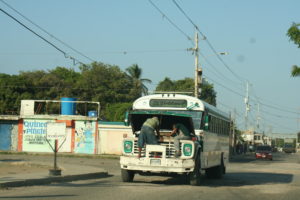
“At a meeting of 40 teachers, there was only one car in the car park.”
The mother of one of our students had to pay 400,000 bolívars to have her car serviced. She earns a relatively good wage of 240,000 bolívars per year, or 20,000 bolívars per month. One of our MSCs, Fr John Jennings, had work done to his car at a cost of 240,000 bolívars for the parts. That covered, oil, ball bearings, and getting the wheels fixed. Labour was an additional 40,000 bolívars. More work needs to be done, but if you converted the total of 280,000 bolívars to USD on the day the work was done, you would get $112 – $96 for parts and just $16 for labour.
Petrol is cheap here. Actually, the price of petrol is almost non-existent. Before devaluation came in last year, USD $1 would have filled 31,300 Ford Fiestas. Today, people get the petrol for free, and the only cost is tipping the petrol attendant. Engine oil, on the other hand, can be expensive, at a cost of almost USD $5 per litre.
There are fewer cars, taxis, and buses on the road now – it’s just too expensive to run a car. I attended a meeting of around 40 teachers in Maracaibo, and there was only one car in the car park. It was a 1957 Volkswagen, which was very impractical and far too low for the roads, but must have belonged to a real enthusiast! Can you imagine a teachers’ meeting in Ireland with one car in the car park? We would think that there was nobody there.
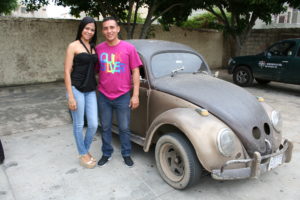
Trucks are used as buses, or big taxis, so people can get around. After the teachers’ meeting, we were driving home in Fr Vincent’s car, and a big truck passed. We realised that the people in the truck were waving at Fr Vincent’s car – and then we saw it was the teachers, all going home from the meeting together. They were travelling together in the truck, as they didn’t have their own cars.
- A group of teachers in Maracaibo travelled to and from a department meeting together in a truck, as they didn’t have their own transport.
- A group of teachers in Maracaibo travelled to and from a department meeting together in a truck, as they didn’t have their own transport.
- A group of teachers in Maracaibo travelled to and from a department meeting together in a truck, as they didn’t have their own transport.
Even the head teacher doesn’t have a car – she walks to school every day. Another one of the teachers has to pay 400 bolívars a day on transport, just to get to and from work. In a country where every cent counts, the cost of – and lack of – available transport is just another challenge for local people to struggle with on a daily basis.”
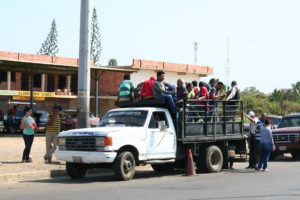
PLEASE SUPPORT OUR MSC MISSIONS
Read Fr Michael’s thoughts on the Venezuelan economy crisis
Find out more about the importance of food availability to Venezuelan families
Read more about Fr Michael’s visit to Caracas
Find out more about our missionary outreach in Venezuela
Fr Michael visits Venezuela: Food for thought
In January 2019, MSC Missions Office Director Fr Michael O’Connell spent three weeks in Venezuela, visiting MSC parishes in the cities of Maracaibo and Caracas. Here, he shares his experiences and his thoughts on a country in crisis.
“Food is a big thing in Venezuela. The government is supposed to issue CLAP food boxes to each household once a month. It doesn’t happen every month; that all depends on the local committee. In some areas, the food parcel is a bag, not a box, so it contains a smaller amount. It’s extremely inconsistent. Before Christmas 2018, there were protests with roads blocked in local areas, because the government promised every family a leg of pork to share for Christmas – but of course, it didn’t happen. Some got it, and others didn’t. Once again, the government had a great idea, but it just didn’t happen.
When it comes to the food parcels, it doesn’t matter how many people are in a household – it’s one box per household per month. There might be three people or there might be 10, but everybody gets the same box (if they get one at all). Each box contains a good selection of basic food: sugar, black beans, rice, two packets of spaghetti, lentils, two litres of cooking oil, six tins of tuna, and ketchup.
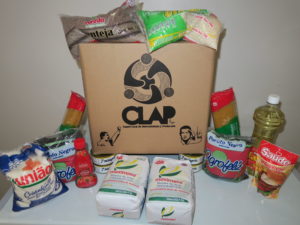
The food box doesn’t always arrive as it’s supposed to, but when it does come, it makes a huge difference as it contains quite an amount of food. Once again, this is in theory, and if the box contains what it’s supposed to – in some places, it’s just a plastic bag, and in other places, it’s nothing at all. The boxes tend to be distributed in Caracas, the capital, but not in Maracaibo. When I mentioned food parcels in one of our parishes in Maracaibo, they looked at me like I had two heads.
On occasion, it’s possible to buy a food parcel for 300 bolívars and legally sell it on for 1,800 bolívars. It can legally be sold for six times its purchase price – but what can locals buy with 1,800 bolívars? During my trip, I priced a small loaf of bread at 1,200 bolívars, a kilo of cheese at 3,000 bolívars, and 24 eggs at 6,000 bolívars. The price of the food parcel won’t go very far.”
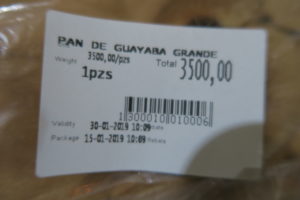
“Often, food is a matter of impressing a visitor.”
“One of the staple foods in Venezuela is arepa – it’s a form of ground maize, and it’s eaten toasted, fried, hot, cold… Every which way! Our equivalent would be a toasted sandwich. It’s about the size of a bagel, but a lot thinner, maybe half the depth. They cut it in half and put fillers in it. They usually have something like a marmalade or a jam on top of it, and then they put ham or cheese on top of that. The ham is quite watery, while the cheese is cheap, with a lot of salt in it. My curiosity was piqued at the combination of cheese and marmalade, and when I asked about it, I was told that the marmalade keeps the cheese from falling off! It’s nothing to do with the taste, but is a matter of practicality.
Often, food is a matter of impressing a visitor. Nobody wants to be thought of as being mean. If you’re having a celebration, it’s important to provide food. One evening during my stay in Maracaibo, I attended the first night of a Novena to Our Lady of Peace. A local group visited different houses, praying the rosary and singing hymns. One family gave out arepa with juice and coffee. There were between 20 and 25 people there, and there was enough for everyone – but it was eaten in darkness as there was no electricity. The house was lit by candles and the light from mobile phones, if people had them.
I also attended a meeting of teachers in Maracaibo, where lasagne and cake were provided. The high point of the gathering was the food. The lasagne came in big slices, but it was very stodgy, with very little meat. The cake was interesting – it was a round cake, and was cut in circles, not triangles. The circles were then sliced up, and it was very effective. There were no saucers or plates like we would provide, just serviettes and plastic cups for people to put their slice of cake in. There was no tea or coffee provided either; people brought their own drinks.”
- Fr Michael visits a teachers’ meeting in Maracaibo.
- Fr Michael visits a teachers’ meeting in Maracaibo.
- Fr Michael visits a teachers’ meeting in Maracaibo.
“He who divides gets the biggest portion.”
“Generally, people eat very poorly. I found that the food was better this year than when I visited last year, but I think that’s down to the designated forager, or shopper, doing a good job. There is food there if you have the money to buy it. In Maracaibo, there’s a supermarket called the Ritz! Here on our side of the world, we associate the Ritz with a luxurious afternoon tea or a glamorous place to stay – in Venezuela, a trip to the Ritz means being able to buy basic groceries for your family.
Having said that, the shelves in the supermarkets can often be empty. In one chemist I visited, packets of paper tissues were put out to fill the shelves – all they had left was half a packet of blood pressure tablets. There are runs of things, and then they disappear. During my stay, I came across a man selling things like rice, flour, and oil, using WhatsApp. He was offering so much at such a price, and I wondered how he had access to all of this food when he wasn’t a wholesaler. I was told he must have a connection to someone in the know. His prices changed every day, but people with money to spend have phones and have access to social media, so WhatsApp was a very effective means for him.
- A local chemist had very little in stock, with packets of tissues on display to make the shelves look full.
- A local chemist had very little in stock, with paper tissues on display to make the shelves look full.
- A local chemist had very little in stock, with packets of tissues on display to make the shelves look full.
One Sunday, I came back from Mass to find the road outside the MSC house blocked. A pop-up stall had been set up by the government, selling potatoes, carrots, and onions, and people were queuing to buy vegetables. The agricultural department had set up the stall, selling limited amounts of each item – people could only buy a maximum of 2kg of each item, for 2,000 bolívars each.
Cash is in short supply, the debit card is a big thing, and this stall facilitated debit card purchases. The government sometimes gives gifts of money into peoples’ bank accounts, so many people use their debit cards to pay for most things. This stall was set up out of the blue on a Sunday morning, and they stayed all day – with people queuing to buy produce until they left.
- A vegetable stall was set up in Caracas one Sunday morning, with queues of people arriving to buy food.
- A vegetable stall was set up in Caracas one Sunday morning, with queues of people arriving to buy food.
- A vegetable stall was set up in Caracas one Sunday morning, with queues of people arriving to buy food.
There is a saying in Venezuela: ‘He who divides gets the biggest portion’. When it comes to food and survival, I think that says it all.”
PLEASE SUPPORT OUR MSC MISSIONS
Read Fr Michael’s thoughts on the Venezuelan economy crisis
Read more about Fr Michael’s visit to Caracas
Find out more about our missionary outreach in Venezuela
Fr Michael visits Venezuela: An economy in crisis
In January 2019, MSC Missions Office Director Fr Michael O’Connell spent three weeks in Venezuela, visiting MSC parishes in the cities of Maracaibo and Caracas. Here, he shares his experiences and his thoughts on a country in crisis.
“Having spent time with local families in Maracaibo and Caracas, it’s clear that the new measures put in place to help the economy in Venezuela have essentially done nothing; the government have great ideas, but they just don’t happen, and many aren’t realistic. For example, the president recently announced a new law stating that nobody could be made redundant for the next two years, and during my stay, he announced a new measure to end inflation – a wage rise from 5,000 bolívars per month to 18,000 bolívars per month. Sadly, this is something that many businesses just can’t accommodate, and these are unfortunately not economically viable solutions.
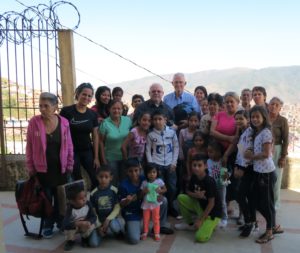
Similarly, during my stay, the government announced that they would solve the country’s milk shortage with 40 pure-bred cows that would form the basis of a new milking herd. They also recently said that they would be commencing a new scheme to make their cities beautiful. All of these fabulous plans are suggested, but at the end of the day, people are suffering terribly in reality.
The value of the bolívar changes daily and fluctuates wildly. When I arrived in Caracas on January 4th, the average monthly wage of 5,000 bolívars was worth USD $7. A week later, on January 11th, the same 5,000-bolívar wage was worth just USD $2. When you think that a loaf of bread costs around 1,200 bolívars, a kilo of cheese costs 3,000 bolívars, and 24 eggs cost 6,000 bolívars, it’s a mystery as to how people survive.
- Fr Michael visits Venezuela.
- Fr Michael visits Venezuela.
- Fr Michael visits Venezuela.
Most purchases are made by debit card. The money system changed last year, when the government took five zeros off their money and reprinted the notes as a measure to tackle inflation – now, nobody wants a 2-bolívar or a 5-bolívar note, when you think that one US dollar is worth thousands of bolívars. Everybody checks the rate of the bolívar daily – but it’s the black market rate, as the official rate means nothing to people trying their best to get by.
I might price an item one day, but the following day, the value of the bolívar has gone down and the price of the item has gone up. Because of this, many people and businesses have bank accounts abroad, particularly in the US. People depend hugely on charity from family members aboard, and money is deposited in US dollars in these accounts for them. Families are very linked up at home and abroad, and they help each other, depositing money in USD because the value of the bolívar changes so frequently.”
- Fr Michael visits Venezuela.
- Fr Michael visits Venezuela.
- Fr Michael visits Venezuela.
“Really, it’s a mystery as to how people survive from day to day.”
“People aren’t wheeling and dealing – they’re just surviving, and really, it’s a mystery as to how people survive from day to day. Families tend to live together, so they have multiple wages coming into the house. One of our students was telling me that he went home to visit his family for a few weeks last summer, but he was embarrassed to be there because he was an extra mouth to feed and he wasn’t contributing anything. He told me that his family were not poor, that they were a comfortable, middle-class family, but now, he said, ‘we are becoming poor middle-class’.
In terms of economic measures, it’s estimated that it will take Venezuela 20 years to recover from this crisis. Back in the 1990s, Venezuela was ranked around 29th in the world for its standard of living. Last year, they ranked in the mid-40s. It took them 20 years to get to that point, and now it will take another 20 years to get back to where they were. In the meantime, people are left with no real end in sight to their daily struggle for simple survival.”
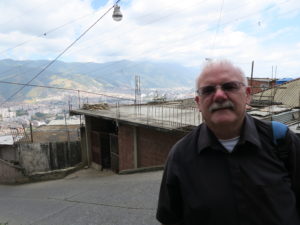
PLEASE SUPPORT OUR MSC MISSIONS
Read more about Fr Michael’s visit to Caracas
Find out more about our missionary outreach in Venezuela
Gospel Reflection for the Feast of St Patrick | March 17th
Gospel Reflection
Reflection & Dialogue:
We preach the Gospel not to please mortals, but to please God.
The Gospel (Luke 10:1-12, 17-20):
Eternal voices: Christ, Peter, Patrick.
Messages for St Patrick’s Day.

On this feast of our national apostle, there are many voices inviting us to listen. It is Christ himself who speaks when Holy Scripture is read in the church, and this voice is addressing Church authorities and all of us through the prophet Amos: “Go and preach to my people,” preaching to all to be faithful to the covenant, to the teaching of Christ and his Church. The voice of Paul reminds us that there will always be accusations (not all of them true), difficulties and obstacles to the preaching of the Gospel message. The voice of Paul also reminds us of the need of honesty and transparency for all involved in teaching the Christian message. Then we are reminded of the “voice of the Irish” to Patrick to return to Ireland and walk again among its people. His voice and his prayer for our fidelity are still with us. Then we have the voice of Jesus concerning Peter to have confidence, since his Saviour has prayed for him that his faith may not fail, but that he might confirm his brothers and sisters in this faith.
And now, as we have a call for a new evangelization, we have the successors of Peter, Pope Emeritus Benedict XVI and Pope Francis, gently, but firmly, calling on the Church to return to her true self. Shortly before he retired, Pope Benedict XVI reminded the Church that while she was in this world she was not of this world. In his very first days in office, Pope Francis has called on the Church to be faithful to her true self, and called on believers help facilitate a spiritual renewal or face the possibility of the Church being considered a compassionate, pitiful, NGO. Of course, it is not that the Church is not concerned about such work; it is central to her mission. But her fundamental call is her relation to Christ her founder, and participation in his sufferings and resurrection.
It is hoped that reflections such as these may help on this feast of our national patron, to revive the fervour of the faith he preached and lived. As he tells us in his Confession, St Patrick prayed that God may grant that he may never lose the Irish people which God possessed for himself at the ends of the earth. In this time of great danger for the faith in Ireland, let us pray to God, through the intercession of our National Apostles, that this may be so.
Fr Martin McNamara MSC
Sr Orla Treacy receives International Woman of Courage Award 2019
Sincere congratulations are in order as Sr Orla Treacy IBVM has received the International Woman of Courage Award 2019, having been nominated by the U.S. Embassy to the Holy See.
The awards ceremony took place in Washington D.C. on March 7th, with ten women in total being honoured. US Secretary of State Mike Pompeo hosted the ceremony, while First Lady Melania Trump addressed those in attendance.
According to the official website, the International Woman of Courage Award “recognizes women around the globe who have demonstrated exceptional courage and leadership in advocating for peace, justice, human rights, gender equality, and women’s empowerment, often at great personal risk and sacrifice”. Sr Orla’s work in education and healthcare in war-torn South Sudan has made her a truly worthy nominee.
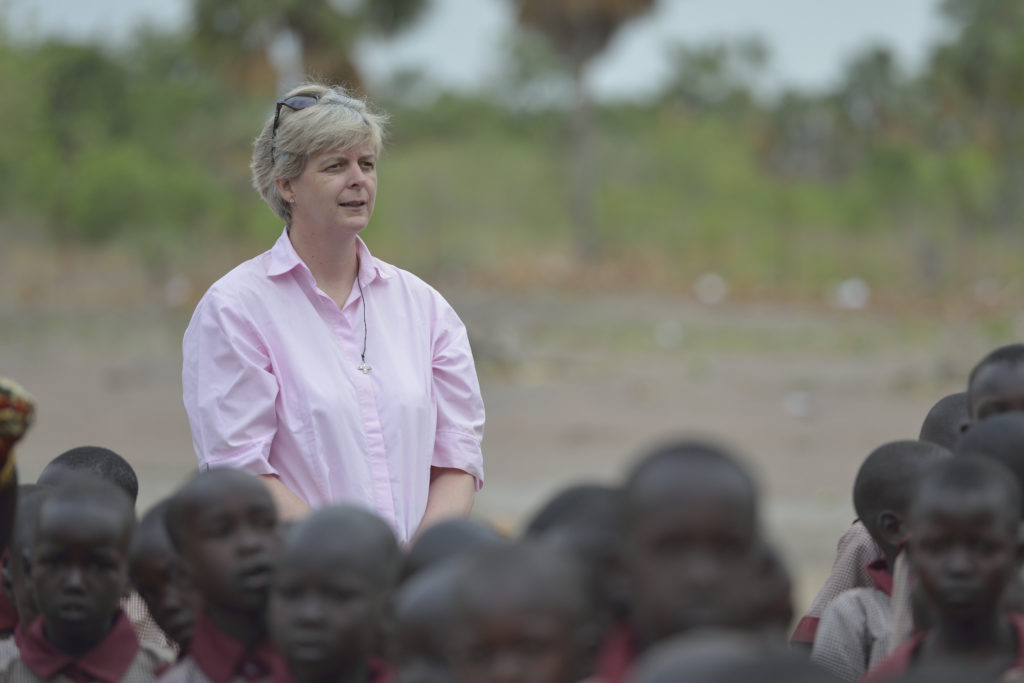
The official website gives a short biography highlighting Sr Orla’s work:
“Born in Ireland in 1973, Sister Orla Treacy was, at a young age, inspired by the lives of service and compassion of her teachers who were religious sisters. After studying to become a teacher of religion, she joined the congregation of the Institute of the Blessed Virgin Mary (IBVM), known as the Loreto Sisters. In 2006, while teaching and offering pastoral care in Ireland, Sister Orla joined other Loreto Sisters who were starting a new mission in Rumbek, South Sudan–an area besieged by civil war and violent inter-clan conflict. Touched by the plight of girls who were being forced into early marriage and denied the right to an education, she took action. Sister Orla and the Loreto Sisters started a girls-only boarding school with 35 students. Today, Sister Orla serves as the head administrator of the Loreto Rumbek Mission in Maker Kuei, overseeing a boarding secondary school for girls, a co-educational primary school, and a women and child-centric primary healthcare facility. Sister Orla is a part of a diverse multinational team of religious sisters, educators, nurses, and other support staff, who all share a vision for improving the lives of the most vulnerable in the community. Despite the devastating consequences of war in Rumbek, and the many barriers to women and girls in the community, Sister Orla remains filled with hope, and the Loreto Schools stand as a beacon of light for future South Sudanese generations. She continues to work in faith, striving for a world in which girls are not forced into marriage, are allowed to complete their education, and can pursue their dreams.”
“This award belongs to the young women of South Sudan with whom I have the privilege of working.”
In November 2017, Sr Orla was awarded the Hugh O’Flaherty International Humanitarian Award, and this year’s nomination for the International Woman of Courage Award is yet further recognition of her tireless work with vulnerable families in Maker Kuei.
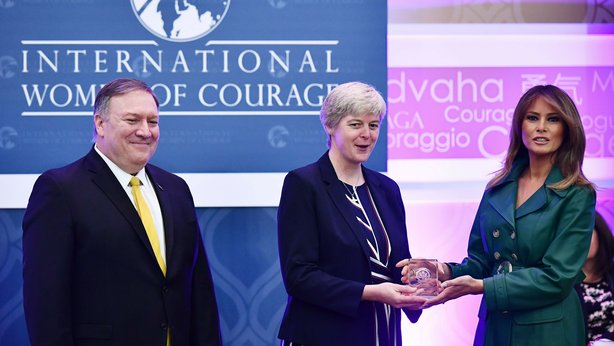
The Loreto Rumbek website recounts Sr Orla’s thoughts on receiving the International Women of Courage award: “This award belongs to the young women of South Sudan with whom I have the privilege of working. Our students embody all that is courageous – they are young women of vision, strength and hope. Young women who dream of a better country for themselves and their families, who are prepared to challenge old structures and work towards making South Sudan great. I am grateful to all who have made this possible.
Our work in South Sudan is not possible without the ongoing support of our partners, our wider Loreto family, past pupils, students, staff and our local community in Rumbek. Our Church leaders, community leaders and local government leaders have all played a significant role in supporting our mission.
Today, I was very aware of our girls as I was receiving the award. I pray that I am paving the way for them. My hope and dream is to see one of them with this award in the future.”
Working together for a brighter future
Since the summer of 2017, the Missionaries of the Sacred Heart have been working together with Sr Orla and the Loreto community of Rumbek, South Sudan, to provide financial support for the tremendous work being done in education and health care there.
On a visit to the MSC Missions Office in Cork, Sr Orla extended her gratitude to the MSC community for their support. “It is unique for one congregation to financially support another one, so this contribution to our work in Rumbek is extremely generous,” she said. “Sincere thanks for your generosity and for your willingness to collaborate in helping us with this challenging yet worthwhile mission.”
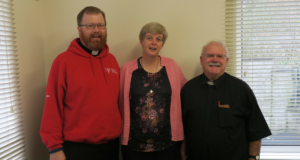
We are proud to support Sr Orla and the wonderful work of the Loreto Rumbek community, and we are sending our very best wishes on this great achievement!
Read RTE’s report on Sr Orla’s award.
The Missionaries of the Sacred Heart are proud to support the wonderful work done by the Loreto Sisters for the young women of South Sudan.
For more photographs and further information about Loreto Rumbek, visit their website or visit their Facebook page.
You can also find out more about how MSC Missions work with Loreto Rumbek – and how you can help to make a difference to the young women of South Sudan.
PLEASE HELP US TO SAVE LIVES IN SOUTH SUDAN
Student Ambition: Abraham’s Story
Abraham Palpialy is a student at Siwa Lima St Joseph’s Technical School in Langgur, Indonesia. Built in 1970, the school is run by the Missionaries of the Sacred Heart with the aim of educating young people in the region so “they can do something good for themselves and for their families”. In a region where poverty is a pressing issue, St Joseph’s provides the youth of the community with hope for the future. Here is Abraham’s story:
 “My name is Abraham Palpialy and I am 16 years old.
“My name is Abraham Palpialy and I am 16 years old.
My father is a farmer. He had a great desire for his children to attend St Joseph’s Technical School because, for him, this school is the most effective one and is exactly what he wants for his children. When I am finished my studies, I can do something useful at once, as my qualifications will facilitate me to get a new job.
I wish to become a creative technician. If I am a qualified technician, I will be able to get a good job and make my family and my teachers proud of me.
I chose to study electricity. I already have skills and a good capability in the department of electricity, and I am sure that when I finish my studies, I will be able to get a new job at once. This is my great wish.
In addition, I must learn to be responsible, trustworthy, to have self-discipline, and to respect my teachers and my fellow students.
Above all, I would like to express my great thanks to St Joseph’s and all the teachers who help me to develop my knowledge, my skills, and my abilities. For me, St Joseph’s is the best school in the province. Viva St Josephs Siwa Lima!”
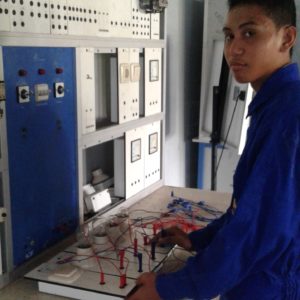
PLEASE HELP US TO TRANSFORM LIVES IN INDONESIA
Celebrate Mother’s Day with MSC Missions
“A mother holds her children’s hands for a short time, but she holds their hearts forever.”
So the saying goes, and never are we reminded of this more than on Mother’s Day, when we celebrate the wonderful women who raised us. Whether we see them every day, talk on the phone every week, or hold their memory dear, Mother’s Day is a time to stop and remember a love like no other.
This year, we celebrate Mother’s Day on Sunday, March 31st
– and you can make it a day to remember with a thoughtful gift from our Mother’s Day range.
Our special Mother’s Day candle features a poem to celebrate a beloved mother, and is a gift to treasure throughout the year.

Elegant angel statues inscribed with affectionate messages are the perfect way to show you care.


The traditional Madonna and Child image honours maternal love in its purest form. With a white resin holy water font and a hand-painted statue to choose from, these are timeless gifts to celebrate a mother’s love.
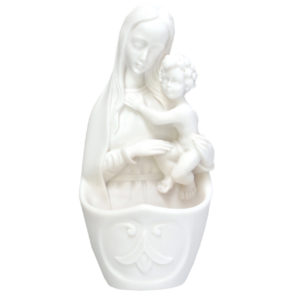
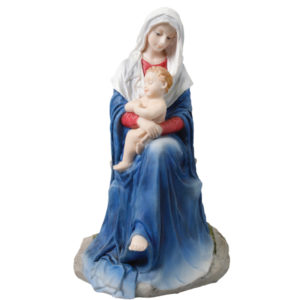
Our beautifully designed Mother’s Day cards all include a thoughtful Prayer for my Mother, and each one includes remembrance in a special Triduum of Masses, which will take place this year from Saturday, March 30th to Monday, April 1st at the Sacred Heart Church on the Western Road in Cork. This is an especially lovely way to remember mothers who are no longer with us, and who memories are carried in our hearts always.
- Mother’s Day cards from the Missionaries of the Sacred Heart
- Mother’s Day cards from the Missionaries of the Sacred Heart
- Mother’s Day cards from the Missionaries of the Sacred Heart
Of course, when you choose from our range of Mother’s Day cards and gifts, you’re not just making a special gesture for your mother, but you’re also reaching out to help mothers and their families all over the world. Your support helps us to continue bringing the gift of hope to families and communities in need across the globe. Our MSCs work in regions of extreme poverty and hardship, bringing vital aid to people who have nowhere else to turn, and every order we receive makes a real and valuable difference.
MSC Cardinal John Ribat speaks out on climate change
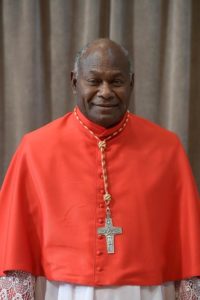 With climate change becoming a growing concern in today’s world, Cardinal John Ribat MSC, Archbishop of Port Moresby, Papua New Guinea, has spoken out about the vital importance of awareness and action.
With climate change becoming a growing concern in today’s world, Cardinal John Ribat MSC, Archbishop of Port Moresby, Papua New Guinea, has spoken out about the vital importance of awareness and action.
French Provincial Leader Fr Daniel Auguié MSC spoke with Cardinal Ribat in Port Moresby recently, and the interview was published in the French provincial bulletin Entre Nous.
“I think it’s right, good, and necessary for someone to take those issues and bring them to the governments here and around the world,” says Cardinal Ribat. “And what I defend most vigorously is the hierarchy of considerations. In this part of the world, we live in islands, archipelagos, and we are the first concerned by the rise of the sea level, and the global warming of the planet.”
“This is a gigantic problem. It will affect us all.”
“By 2050, many islands will be gone,” he continues. “Papua New Guinea is already seeking shelter for the islanders who will be affected in the next few years. I recently visited two of our islands, including Andra. They are building dikes. This island has about 700 inhabitants. The living space diminish visibly. They showed me how far their island was before. A huge part is already submerged. We went around the island on foot in twenty minutes. The question is simple: what will we do when this island is completely gone?”
This is a real concern for local families whose homeland is quite literally disappearing before their eyes. “Currently, most locals say they will ask relatives or relatives who live in this or that island to welcome them,” says the Cardinal. “But we know that this is not the solution because these other islands will disappear too. This is a gigantic problem, because global warming will not spare any archipelago, no island. It will affect us all.”
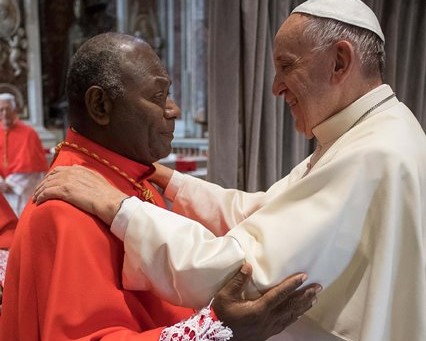
The effects of climate change on a national scale in Papua New Guinea are very clearly representative of a much larger concern on a global scale. “This first question posed by the observation of the effects of global warming brings another question as to its causes,” Cardinal Ribat explains. “When we talk to people in the islands, they ask us, ‘Why does this happen? There was nothing to let us foresee …’ Some of them now hear and understand that this is actually the result of gas emissions throughout the planet, and in particular from industrialised countries. The people of the Pacific are coming together today to demand the removal of greenhouse gas emissions from the atmosphere and a change in lifestyle around the world.”
“We are urged by Pope Francis to hear not only the cry of the poor, but also the cry of the earth.”
Writing for the Spring 2019 JPIC Chevalier Family bulletin, Fr André Claessens MSC emphasises the necessity for increased awareness and conscious change. “Climate change asks for huge investments,” he writes, “but it also generates profits and it will benefit future generations. Climate-related disasters caused about 300 billion euros worth of damage in 2017, and the WHO calculated that in Europe alone, pollution costs more than 1.6 trillion dollars every year. Two hundred species are in danger of becoming extinct. Greta Thunberg said it clearly: ‘We have all the facts and solutions. All we have to do is to wake up and change’.”
As we consider how we can contribute to positive change, Fr Claessens sums it up in a nutshell: “We are urged by Pope Francis to hear not only the cry of the poor, but also the cry of the earth. We have had thirty years of pep-talks… Now action and only action will give hope!”
Gospel Reflection for the Sixth Sunday in Ordinary Time | February 17th
Gospel Reflection
Reflection & Dialogue with Questions of the Day:
Joy of the Kingdom of God,
God’s plan for those who accept him, unlike the others.
The Gospel (Luke 6:17, 20-26):
How happy are the poor. Alas for you who are rich.

Today’s Gospel reading gives us Luke’s version of the Beatitudes, somewhat different from the better-known text of Matthew. On an initial reading, one may be inclined to give a Marxist interpretation of Luke’s Beatitudes, as, so to speak, a triumphalist future victory of the proletariat over their oppressors! But nothing could be further from the truth. The first readers of Luke, as we today, would understand Luke’s Beatitudes within Luke’s layout of his work: the call of his first disciples, with emphasis on Peter, as read last Sunday, the call of Levi (of the detested tax collectors’ rank), and the objections to this, various healings and actions by this, followed by objections and queries to this new way of acting.
Jesus has been preaching and acting out his new message for his followers and humanity. Jesus next set about seeing that is work and message continues, a momentous event for him which he prepares for by spending the night on the mountain in prayer. His message from God requires contact with the divine. Then he comes down and chooses twelve of his disciples, whom he also names apostles. At the foot of the mountain, on a level place, there are many with different diseases who come to him to be healed, a model of future humanity. These are not his disciples. He then, in the Beatitudes and Sermon, addresses his disciples who will later carry his message.
Jesus is conscious that he is in the succession of the prophets and his version of the Beatitudes is best understood again the word of the prophet Jeremiah read in today’s first readings: Blessed are those who trust in the Lord, with the Lord for his hope. Cursed are those who trust in mere mortals. Who make mere flesh their strength. The poor in biblical tradition are a broad category, of neglected and so on. God’s coming plan, his kingdom, is for them. The hungry are those who avidly look forward for some positive future. Those who mourn, in biblical tradition are those in sorrow for the sad state of the holy city, their holy land, or general situation. The three positive Beatitudes of possession of the kingdom do not end in triumphalism, but in a call to rejoice in the rejection, suffering, or even persecution that will form part of living the Beatitudes, In Jesus’ eyes, it all belongs to the prophetic heritage, carrying a message of hope, which will be responded to by opposition.
These Beatitudes have still a message for us all and for the Church.
Fr Martin McNamara MSC
Kerala Floods: An update from Kanjoor
In the summer of 2018, we reached out to our mission friends to support our MSCs and local parishes in Kerala, India, where the worst flooding in almost a century caused untold devastation. Heavy rainfall wreaked havoc across the state, and the MSC Kerala House suffered from severe water damage.
Fr Richard Suresh MSC has been in touch from Kerala to update us on the ongoing repair work in the Sacred Heart Seminary in Kanjoor. “Painting work, roofing work, and pathway repair has been going on,” he writes. “It is very difficult to get workers in Kerala, as there are many, many houses that need workers to carry out repairs. We have not yet been able to finish the repairs as we had planned, due to the lack of workers available, but we are still working on it.”
- Work is underway at the Sacred Heart Seminary to repair the damage caused by severe flooding in Kerala last August.
- Work is underway at the Sacred Heart Seminary to repair the damage caused by severe flooding in Kerala last August.
- Work is underway at the Sacred Heart Seminary to repair the damage caused by severe flooding in Kerala last August.
The flooding hit Kerala in August 2018, killing hundreds and forcing millions to flee from their homes. Cars, livestock, homes, and businesses were washed away in the deluge.
The Sacred Heart Seminary in Kerala was severely affected due to its close proximity to the River Periyar, and is currently undergoing the repairs outlined by Fr Richard. At the seminary, MSC students journey together on the path to priesthood, and the house serves as a local foundation for parish outreach and ministry. The repair works are essential to ensure the safety and security of the MSC community in Kerala, allowing them to continue their vital work in aiding local families who have suffered terrible losses in the floods.
- Flooding at the Sacred Heart Seminary, Kerala, in August 2018.
- Flooding at the Sacred Heart Seminary, Kerala, in August 2018.
- Flooding at the Sacred Heart Seminary, Kerala, in August 2018.
“Thank you for all your support, concern, and love towards our Indian MSC community,” writes Fr Richard. “Please keep us in your prayers, and we assure you that you are in our prayers also.”
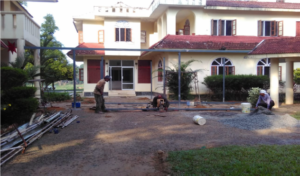
PLEASE HELP OUR MSCS IN KERALA
Read more about the damage caused by the Kerala floods
in a letter from Indian Union Secretary Fr Syam Kumar MSC.
